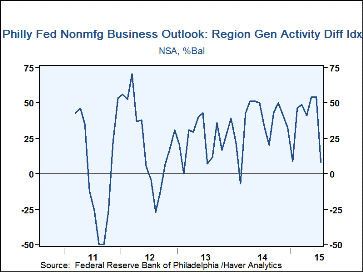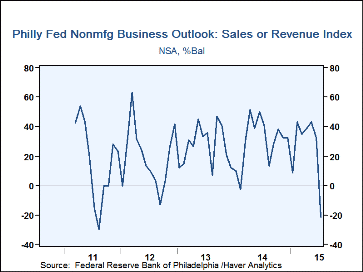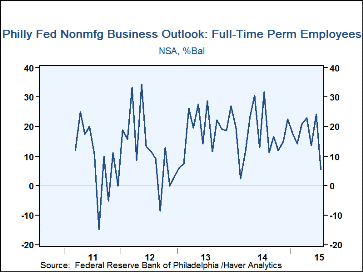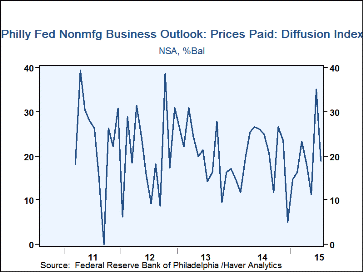 Global| Jul 21 2015
Global| Jul 21 2015Philadelphia Fed Nonmanufacturing Readings Deteriorate
by:Tom Moeller
|in:Economy in Brief
Summary
The Philadelphia Federal Reserve reported that its Index of Nonmanufacturing Sector Activity fell sharply to 8.1 this month from an unrevised 54.1 in June. These figures are not seasonally adjusted. Since inception in 2011, July [...]
The Philadelphia Federal Reserve reported that its Index of Nonmanufacturing Sector Activity fell sharply to 8.1 this month from an unrevised 54.1 in June. These figures are not seasonally adjusted. Since inception in 2011, July readings have deteriorated sharply from June. Sales, however, deteriorated to a record extent followed by a sharp deterioration in new orders, unfilled orders and inventories.
The rate of full-time hiring declined sharply to the lowest level since February of last year. The degree of m/m deterioration, however, has not been common for July. A separate measure of part-time hiring deteriorated to an unusually large extent. The length of the average workweek similarly weakened. Finally, capital spending activity declined, notably for equipment & software, to the weakest level since January of last year.
Pricing power eased considerably m/m and y/y, but a firming trend for prices paid remained intact. Prices received, however, deteriorated markedly. Strength in wages and benefits lessened considerably, as can happen in July.
The outlook for business activity in the region has been optimistic for the last two years. Optimism at the company level, however, deteriorated sharply this month.
Philadelphia Fed figures are diffusion indexes which are calculated by subtracting the percent of respondents reporting poorer business conditions from those reporting improvement. Thus, they have a good correlation with growth in the series covered. The data is available in Haver's SURVEYS database.
Assessing the Recent Behavior of Inflation from the Federal Reserve Bank of San Francisco is available here.
| Philadelphia Fed Nonmanufacturing Business Outlook Survey (NSA) | Jul | Jun | May | Jul'14 | 2014 | 2013 | 2012 |
|---|---|---|---|---|---|---|---|
| General Activity - Region | 8.1 | 54.1 | 54.5 | 34.1 | 35.9 | 25.2 | 22.5 |
| New Orders | -5.4 | 27.0 | 27.3 | 29.5 | 28.0 | 20.2 | 20.2 |
| Sales or Revenue | -21.6 | 32.4 | 43.2 | 40.9 | 30.4 | 27.2 | 19.4 |
| Number of Full-Time Permanent Employees | 5.4 | 24.3 | 13.6 | 31.8 | 17.4 | 19.0 | 12.7 |
| Prices Paid | 18.9 | 35.1 | 11.4 | 25.0 | 19.7 | 20.6 | 20.7 |
| Expected General Activity - Region | 81.1 | 81.1 | 79.5 | 84.1 | 83.6 | 80.9 | 73.3 |
Tom Moeller
AuthorMore in Author Profile »Prior to joining Haver Analytics in 2000, Mr. Moeller worked as the Economist at Chancellor Capital Management from 1985 to 1999. There, he developed comprehensive economic forecasts and interpreted economic data for equity and fixed income portfolio managers. Also at Chancellor, Mr. Moeller worked as an equity analyst and was responsible for researching and rating companies in the economically sensitive automobile and housing industries for investment in Chancellor’s equity portfolio. Prior to joining Chancellor, Mr. Moeller was an Economist at Citibank from 1979 to 1984. He also analyzed pricing behavior in the metals industry for the Council on Wage and Price Stability in Washington, D.C. In 1999, Mr. Moeller received the award for most accurate forecast from the Forecasters' Club of New York. From 1990 to 1992 he was President of the New York Association for Business Economists. Mr. Moeller earned an M.B.A. in Finance from Fordham University, where he graduated in 1987. He holds a Bachelor of Arts in Economics from George Washington University.
More Economy in Brief
 Global| Feb 05 2026
Global| Feb 05 2026Charts of the Week: Balanced Policy, Resilient Data and AI Narratives
by:Andrew Cates










